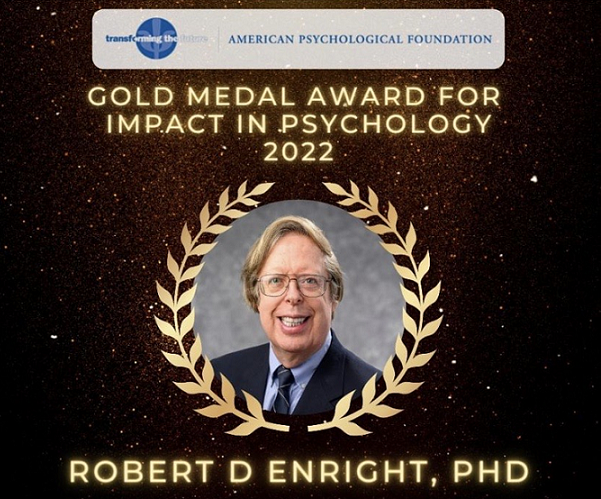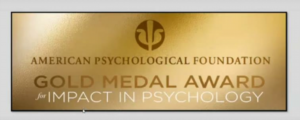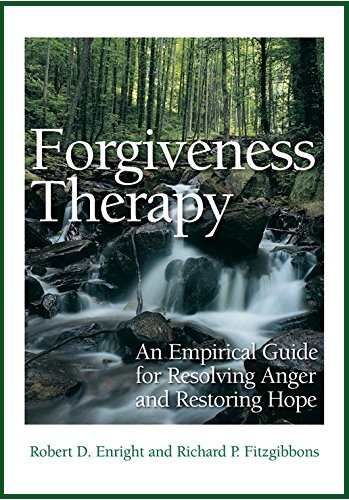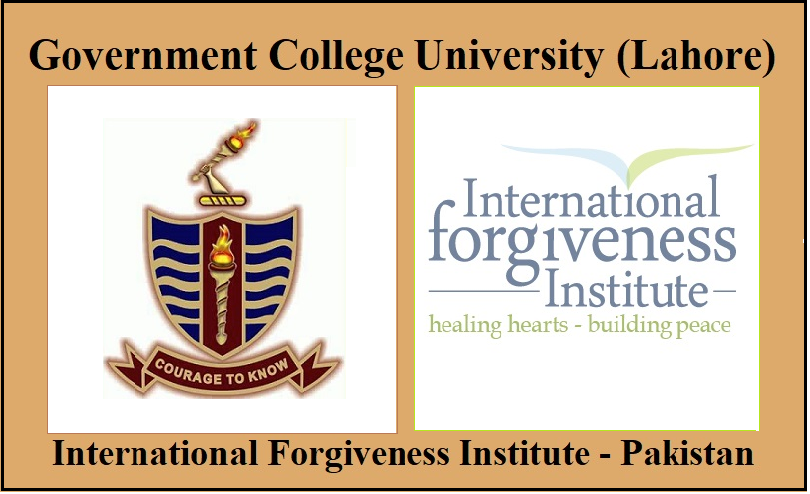Tagged: “Dr. Robert Enright”
Even though I forgive people, I still can get angry when I think back to the person and the situation. It seems to me that I have not forgiven. What do you think?
When we forgive, all of the anger does not necessarily leave us. We still can have residual feelings that include anger, sadness, and disappointment. If these emotions are not frequent and intense, and if you have gone through the forgiveness process and are wishing the other well (even if you cannot reconcile), then I think you are forgiving. This does not mean that there is no more work to do. When the negative emotions surface, consider going through the forgiveness process again. It likely will be quicker and take away, once again, some of the negative emotions.
I have a pattern of saying to myself, “I forgive you” whenever someone is unjust to me or even when I am somewhat annoyed. I now am wondering: Am I actually forgiving when I do this or am I not forgiving?
Forgiving is a process that requires more than a statement such as “I forgive you.” Your statement to yourself may be more of a promise to now work on the process, to commit to the struggles of seeing the inherent worth in the other person, to bear the pain of what happened, and to be good to the person (within reason; you need not reconcile if the other is harmful to you). So, try to see the positives in your statement to yourself. Try to see it as the beginning of the commitment now to follow through with the hard work of forgiving.
My daughter recently divorced her husband. She wants nothing to do right now with forgiving him. On the other hand, I am interested in forgiving him for how he treated my daughter. My question for you is this: Can I forgive him or would I be disloyal to my daughter who does not want to forgive?
You are free to choose forgiveness in this case. Even though your daughter’s ex-spouse did not hurt you directly, he did hurt you in a secondary sense in that he hurt your loved one. Forgiving in this context is appropriate. You are not being disloyal to your daughter if you choose to forgive to rid yourself of resentment. You need not, then, go to your daughter and proclaim your forgiveness and then pressure her now to do the same. You can forgive without discussing this with your daughter. If and when she is ready to forgive, then you can share your insights about the forgiveness process with her.
In your Process Model of Forgiveness, you have one unit called compassion. I am trying to forgive someone who passed away recently. Can I have compassion on this person and if so, how does this work?
Compassion includes at least four elements:
1) Sympathy toward the one who hurt you. Sympathy is an emotional reaction to another’s pain. For example, if someone comes to you angry that he just lost his job and now is struggling financially, you have sympathy when you feel sorry for the person. His anger and unfortunate situation leads to a different emotion in you: sadness.
2) Empathy toward the one who hurt you. Empathy is stepping inside the other’s shoes (so to speak) and feeling the same feeling as the other. Thus, when the other is angry, you empathize with that person when you also feel anger.
3) Behaving toward the other by supporting him or her in the time of distress. This could include a kind word or talking about the strategy of solving the job problem, as examples.
4) Suffering along with the person. This latter point is the deepest aspect of compassion. It could involve helping the person financially before a new job is secured; it could involve driving the person to a job interview.
In the case of having compassion for a deceased person, you can have sympathy and empathy (the first two elements of compassion), but you cannot engage in the other two elements because behavior with and toward the other is not possible. Compassion need not have all four elements to count as compassion. You can think of the hard times endured by the deceased person and react with sympathy and empathy. Such compassion may aid your forgiveness.
“Forgiveness Pioneer” Wins Inaugural Gold Medal Award for Impact in Psychology
The scientific application of forgiveness, forgiveness education, and forgiveness therapy is being singled out for its “game-changing impact on the field of psychology” by the country’s largest and oldest organization of doctoral-level psychologists.
The American Psychological Foundation (APF), the grant-making arm of the American Psychological Association (APA), has just announced the winner of its first-ever Gold Medal Award for Impact in Psychology—Dr. Robert Enright, a professor of Educational Psychology at the University of Wisconsin-Madison, and founder of the International Forgiveness Institute.
Classified as one of psychology’s highest honors, the award “recognizes a psychologist whose work has had a game-changing impact on the field of psychology,” according to APF board president Terence M. Keane, PhD. He added that the new award acknowledges “a psychologist’s body of work that has been impactful, innovative, and transformational.”
Prior to this year, the award was called the Gold Medal Award for Life Achievement and it has been bestowed on exceptional psychological innovators by the APF for the past 65 years. Previous winners have included B. F. Skinner (the 1971 winner who developed behavior analysis), Harry Harlow (the 1973 winner and a UW-Madison psychologist like Dr. Enright), Rollo May (1987), Mary Ainsworth (1998), and Albert Bandura (2006).
“For the APA and the APF to position forgiveness alongside the creative achievements of those giants in the field of psychology is truly a profound pronouncement,” Dr. Enright said after learning of his recognition.
 As a grant making foundation, the APF helps fund psychologists and students worldwide who are using psychology to address major issues and improve lives. The APA has more than 133,000 members—doctoral-level researchers, educators, clinicians, consultants, and students (associate members). Combined, the two organizations have more than 500 staff members who focus on providing services to psychologists like Dr. Enright who have dedicated their lives to improving the mental health and welfare of others.
As a grant making foundation, the APF helps fund psychologists and students worldwide who are using psychology to address major issues and improve lives. The APA has more than 133,000 members—doctoral-level researchers, educators, clinicians, consultants, and students (associate members). Combined, the two organizations have more than 500 staff members who focus on providing services to psychologists like Dr. Enright who have dedicated their lives to improving the mental health and welfare of others.
Dr. Enright, a licensed psychologist, has devoted 37 years to the scientific study of forgiveness. As the unquestioned pioneer in the field of forgiveness, Dr. Enright published the first social scientific journal article on person-to-person forgiveness and the first cross-cultural studies of interpersonal forgiveness. He also pioneered forgiveness therapy and developed an early intervention to promote forgiveness–the 20-step “Process Model of Forgiving.”
The Enright Forgiveness Inventory (EFI), an objective measure of the degree to which research participants forgive another who has been unjust and hurtful toward them, is now used by researchers around the world. The Enright Forgiveness Inventory for Children (EFI-C), the Enright Self-Forgiveness Inventory (ESF-I), and the Enright Group Forgiveness Inventory (EGFI) have all become standard research tools known simply by their abbreviations.
Dr. Enright also pioneered the use of forgiveness therapy in clinical practice by developing  interventions that gained critical acclaim with the APA’s publishing in 2015 of Forgiveness Therapy, an instructional manual for clinicians written by Dr. Enright and psychiatrist Richard Fitzgibbons, MD. The two authors were selected in 2019 as recipients of the prestigious Expanded Reason Award presented by the University Francisco de Vitoria (Madrid, Spain) in collaboration with the Vatican Foundation Joseph Ratzinger/Benedict XVI (Rome, Italy) “to recognize and encourage innovation in scientific research and academic programs.”
interventions that gained critical acclaim with the APA’s publishing in 2015 of Forgiveness Therapy, an instructional manual for clinicians written by Dr. Enright and psychiatrist Richard Fitzgibbons, MD. The two authors were selected in 2019 as recipients of the prestigious Expanded Reason Award presented by the University Francisco de Vitoria (Madrid, Spain) in collaboration with the Vatican Foundation Joseph Ratzinger/Benedict XVI (Rome, Italy) “to recognize and encourage innovation in scientific research and academic programs.”
Dr. Enright’s ambitious approach to forgiveness education included the development of 14 Forgiveness Education Curriculum Guides for students in grades Pre-K through 12th. Through stories, children learn about the five moral qualities most important to forgiving another person–inherent worth, moral love, kindness, respect and generosity—and eventually, how they themselves can become a forgiving person.
A just-completed meta-analysis by University of Wisconsin-Madison researchers involving more than 1,500 students in 10 countries shows that students enrolled in Forgiveness Education Programs demonstrated reduced anger and increased forgiveness toward those who have hurt them. Those forgiveness guide lesson plans, distributed through the IFI, have been requested by educators in more than 30 countries and contentious regions around the world.
 Adding to its forgiveness education agreements with many of those countries, the IFI’s newest Branch Office is IFI-Pakistan, a partnership with the Government College University Lahore, Lahore, Pakistan–the first in that country and in Southern Asia. In Greece the IFI has trained more than 600 grade school instructors in the past 8 years who are now teaching forgiveness to more than 6,000 Greek students.
Adding to its forgiveness education agreements with many of those countries, the IFI’s newest Branch Office is IFI-Pakistan, a partnership with the Government College University Lahore, Lahore, Pakistan–the first in that country and in Southern Asia. In Greece the IFI has trained more than 600 grade school instructors in the past 8 years who are now teaching forgiveness to more than 6,000 Greek students.
“Although the virtue of forgiveness has made astronomical strides in the past few decades, we are just on the edge of what it can offer us for the future,” Dr. Enright says. “Forgiveness must have a seat at the peace-keeping and peace-making table.”
According to Dr. Enright, his body of work has clearly demonstrated that as people forgive, they become less angry, less depressed, less anxious, and more hopeful of their future. In other words, people become more peaceful within themselves, making the possibility of peace with others more likely.
Dr. Enright has outlined his grass-roots approach to peace through a variety of forums beginning with his 2010 article “Forgiveness Education as a Path to Peace,” his 2014 address to the United Nations Population Fund “Forgiveness as a Peace Tool,” and his recent series of 3 essays on peace published on the Psychology Today digital website.
In 2015, Dr. Enright accompanied Eva Mozes Kor, a survivor of the Holocaust, on a series of US radio interviews to promote peace through forgiveness. His peace initiatives have earned him peace educator awards including being named a Paul Harris Fellow by Rotary International in 2016.
Time magazine has called Dr. Enright “the forgiveness trailblazer.” The Los Angeles Times said Dr. Enright is “the guru of what many are calling a new science of forgiveness.” The Christian Science Monitor called Dr. Enright “the father of forgiveness research.”
As the recipient of the 2022 Gold Medal Award for Impact in Psychology, Dr. Enright will be honored during APA 2022–the annual American Psychological Association convention on August 5th in Minneapolis, MN. He will receive a gold medal plaque and a modest honorarium during the APF Friends of the Foundation reception.



